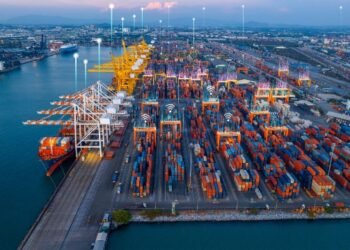The Ministry of Trade, Agribusiness and Industry has moved to calm fears among Ghanaian exporters following the United States’ announcement of a 10% universal tariff on imports, including those from Ghana.
In a statement issued by its Public Relations Unit, the Ministry assured the private sector and the wider public of the government’s unwavering commitment to protecting Ghanaian exports and ensuring trade continuity.
“The Ministry – wishes to assure the Ghanaian private sector, especially major exporters, investors and the general public of Government’s commitment to engage the USA on the current imposition of tariffs on Ghanaian products to avoid trade disruptions and investment decisions in the country”
Ministry of Trade, Agribusiness and Industry
According to the Ministry, an urgent process has already begun to assess the full economic impact of the tariffs and to formulate strategies aimed at mitigating disruptions to trade and investment decisions.
Stakes for Ghana’s Export Economy
Ghana currently enjoys duty-free, quota-free access to the US market under the African Growth and Opportunity Act (AGOA).
This is a nonreciprocal preferential trade agreement between the United States and selected African countries.
The new tariffs, however, represent a major shakeup in this relationship, with Ghanaian exporters now facing rising costs and uncertainty in one of their most important international markets.
“The USA announced on 2nd April 2025 the imposition of 10% universal tariff, effective April 5, 2025, covering imports from all countries including Ghana into the United States”
Ministry of Trade, Agribusiness and Industry
Though goods already in transit by that date are exempted from the new tariffs, the move nonetheless threatens the profitability and competitiveness of Ghanaian exports that depend on the AGOA framework.
The Ministry noted that the US market remains a vital destination for many of Ghana’s “high-priority products,” including cocoa derivatives, gold jewellery, shea butter, cashew, yams, fruits, vegetables, and apparel.
It warned that without timely intervention, the new tariffs could undermine sectors of the Ghanaian economy that are closely tied to US trade.

Reciprocal Tariffs
The US administration’s action also includes reciprocal tariffs ranging between 11% and 50% on imports from over 50 countries, set to take effect on April 9, 2025.
According to the Executive Order issued under the International Emergency Economic Powers Act of 1977 (IEEPA), these measures are a response to growing concerns about the “economic and national security consequences of the United States’ global trade deficits.”
Some products have been spared the new tariff regime, including pharmaceuticals, copper, semiconductors, lumber articles, critical minerals, and various energy products.
However, Ghanaian exports do not feature prominently among the exempt categories, raising fears that sectors reliant on trade with the US may be disproportionately affected.
Engagements and Strategic Planning
The Ministry stated that consultations with stakeholders across the trade ecosystem have commenced in earnest.
“The Ministry as a matter of urgency, is also engaging relevant stakeholders to determine the extent of the effect and assess the full impact of the US tariffs on the country’s economy”
Ministry of Trade, Agribusiness and Industry
These discussions are intended to also prepare a coordinated response that safeguards Ghana’s trade interests.
The government is exploring a range of strategies to minimise the economic fallout.
The Ministry is also placing emphasis on ensuring that the private sector remains well-informed about the evolving trade situation so that businesses can make timely and predictable investment decisions.
As part of the initial response strategy, the Minister for Trade, Agribusiness and Industry, along with the Ministers for Finance and Foreign Affairs, is scheduled to meet with the US Ambassador to Ghana on Monday, April 7, 2025.

The meeting will form the first high-level diplomatic engagement on the matter and is expected to open discussions on possible exemptions or revisions to the tariff structure in favour of Ghanaian exports.
“The Government is committed to ensuring that the private sector is well informed on the details of the imposition to avoid trade disruption as well as ensure predictability of investment decisions in the country”
Ministry of Trade, Agribusiness and Industry
The timing of the tariff imposition presents a new challenge for the Mahama administration, which has recently intensified its efforts in economic diplomacy, especially under the African Continental Free Trade Area (AfCFTA) framework.
While AGOA has been a pillar of Ghana’s trade strategy with the United States, the current development may force a rethinking of both policy direction and trade logistics.
In the meantime, the Ministry’s proactive engagement with stakeholders and its upcoming diplomatic outreach suggest a determined push to cushion Ghana’s economy from the ripple effects of a fast-changing global trade environment.
READ MORE: GSE Rallies as Bulls Roar, Reversing Market Setbacks























